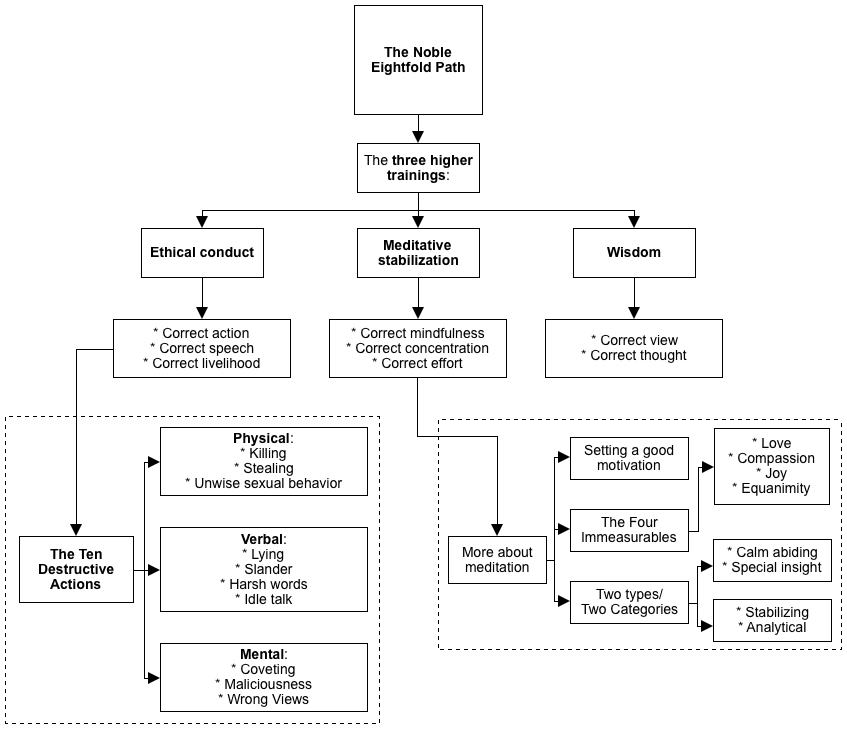Notes
The Ten Destructive Actions
Once we've become interested in developing our Buddha potential, we need to know:
- Which actions are beneficial or "positive"
- Which actions obscure our potential and interfere with our spiritual progress, i.e., which actions are "negative"
From the Buddhist point of view, it's all about the link between our actions and their effects.
- Actions are termed "negative" when they bring unpleasant results for ourselves or others.
- Actions are termed "positive" when they result in happiness for both ourselves & others.
- If we really want to be happy, we need to learn about and live according to the functioning of cause & effect.
The Noble Eightfold Path spells out the three higher trainings. One of those is ethical conduct, which includes correct action, correct speech, and correct livelihood. Another of the Buddha's guidelines regarding ethical conduct is the avoidance of the ten destructive actions, because they destroy the happiness of ourselves & others. The ten destructive actions are divided into three groups:
- physical
- killing
- stealing
- unwise sexual behavior
- verbal
- lying
- slander
- harsh words
- idle talk
- mental
- coveting others' possessions
- maliciousness
- wrong views
The Three Physical Destructive Actions
Killing
Killing refers to taking the life of any living, sentient being.
- As much as possible, we should avoid taking others' lives.
- In some situations, a clear-cut answer is not apparent. We must think deeply about the advantages & disadvantages to ourselves & others of all the alternatives, and do what we feel is best.
- Though it's not fully killing, there is a karmic imprint when you rejoice at someone's death.
Stealing
Stealing is taking what isn't given.
- Stealing can refer to obvious examples, such as armed robbery.
- It also includes things we may think of as innocent or not "really" stealing, e.g.:
- Borrowing something & not returning it
- Taking things from our workplace for our personal use
- Avoiding paying taxes or fees we should pay
Unwise or Unkind Sexual Behavior
Unwise or unkind sexual behavior chiefly refers to adultery.
- This includes cheating on our partner (whether married or not) or having a sexual relationship with somebody else who is involved in a relationship.
- It also includes sexual activity that spreads disease or otherwise harms ourselves or others.
The Four Verbal Destructive Actions
Lying
Lying is deliberately saying what we know isn't true.
- One can also lie physically via a nod or gesture.
- When we worry that telling the truth might hurt someone's feelings, perhaps we can find a way to express something positive without lying about the issue at hand.
- Little white lies are still lies, even if we think we're trying to protect someone's feelings.
- It can become a habit to lie.
- It can ruin trust.
- Of course, we have to use common sense, e.g., if telling the truth would endanger somebody.
Slander
Slandering others is frequently done out of jealousy.
- We may want to speak poorly about somebody else to help our own position, or we may be jealous of a friendship between two people.
- This includes divisive language or words that cause disharmony. Causing disharmony with our speech includes telling this person what that person said in order to create friction between them (whether or not it's true) or making unfounded accusations in order to divide people.
- It's fine to talk over your problems with people, but your thinking should be, "I'm coming to talk with you because I have a problem with anger; I'm not saying that what I'm feeling about this other person is the reality of who they are. I'm talking with you because I need help working on my anger." Otherwise, we're doing what we did in 6th grade.
- Instead of engaging in divisive language, let's use our speech to repair relationships, to deepen relationships, and to create harmony among human beings.
Harsh Speech
Harsh speech is when you say (with a bad intention) things that are hurtful to other people.
- Harsh words include shouting with anger, maliciously criticizing others and making fun of them.
- It also includes teasing to hurt someone or making someone look foolish.
- Saying harsh words with a smile, pretending to be innocent, is still wrong.
- Harsh speech not only hurts the other person, but we're also harming ourselves by putting negative karma in our own mind.
Idle Talk
Idle talk is one of the main ways in which we waste our time and create disturbances in others' minds. All of our conversations don't have to be heart-to-heart, meaningful discussions, but we do need to be careful about the topics we talk about; those topics often come to us in our meditation later on and can be distracting.
- This includes gossip, idle talk about movie stars, sports, cars, fashions, food, etc.
- Sometimes the more we talk about a problem, the more solid it becomes.
- This doesn't mean we shouldn't discuss our problems or confide in others, in order to get another person's view on a situation.
- But when we seek our friend's advice just to validate our own position rather than to explore compassionate solutions, then the conversation has deteriorated into idle talk.
- Joking, laughing, having a good time are not "bad."
- The point of discouraging idle talk is to develop good motivations for talking with people.
- Just be aware who you're talking to, what you're talking about, and for what purpose. Monitor yourself.
The Three Mental Destructive Actions
These non-virtues are done mentally, but can bring about the physical and verbal non-virtues. We have to be more astute to catch the mental destructive actions.
Coveting
Coveting others' possessions occurs when we notice someone's desirable possession and plan how to get it.
- If we have attachment in the mind, and we ruminate on it, it becomes coveting. Coveting then inspires us to do physical & verbal things to get what we want or to eliminate the hindrances to getting what we want.
- This includes hinting or flattering in order to try to get a gift.
- We'd be happier if we trained ourselves to be content with what we have and to rejoice at others' fortune.
Maliciousness
Maliciousness is cultivating ill will and the thought to harm another.
- This includes revenge thoughts or wanting to "put someone in his place."
- It could motivate stealing, killing, creating disharmony, harsh words.
- We need to observe our thoughts carefully to know when we're wishing others harm or rejoicing at their misfortune.
Wrong Views
Having wrong views is denying the existence of something that does exist or asserting the existence of that which is non-existent.
- Wrong views occur when someone emphatically & antagonistically holds an erroneous philosophical or ethical view, e.g., closed-mindedly denying rebirth.
- Ex: It's the wrong view that our actions don't have any ethical dimensions, or even if they do, they don't bring results, or even if they bring results, the actions aren't concordant with the actual actions that are done.
- Ex: It can be wrong views such as there's no Buddha, Dharma, Sangha.
- Wrong views here is not doubt, it's not curiosity, it's not the mind that just wants to investigate & learn.
- It's a very stubborn wrong view that's come about because of thinking about something in the wrong way and coming to the wrong conclusion, and then stubbornly holding on to that view in a closed-minded way so you're not open to hearing anything else.
- It's said that the wrong view is actually the most dangerous because, if we have wrong views about karma & its effects, then we give ourselves license to do the seven non-virtues (destructive actions) that are physical & verbal.
Summary
When we refrain from engaging in the ten destructive actions, we're automatically practicing the ten constructive ones.
- It takes time to change our behavior.
- First, we must learn to recognize the specific destructive actions we do.
- Then we need to apply effort in order to refrain from doing them again.
- Sometimes willpower alone isn't sufficient; we need to deeply understand the disadvantages of the behavior.
- Buddhist teachings contain many techniques for changing our destructive attitudes.
- We can be successful with gentle & consistent effort and with patience.
- One cannot advance spiritually without changing their daily actions to avoid the ten destructive actions.
- We must create the causes to have realizations.
- If we can't control our grossest actions—what we do & say to others—how can we expect to change our minds, which are the source of our actions?
- So we start by eliminating the three physical negative actions & the four verbal ones.
- Simultaneously, we put effort into avoiding the three destructive mental actions, though these are harder and will take longer.

